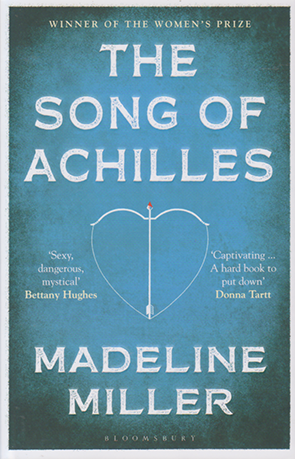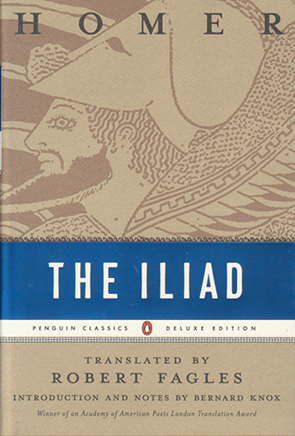An easy recommendation to make about Madeline Miller’s first book The Song of Achilles, is that it would be a good introduction to the story of the Trojan War for those interested in later reading The Iliad by Homer. But Miller’s novel is one of a number of modern retellings of this story. Robert Graves wrote The Siege and Fall of Troy in 1962. The primary purpose of that work was to combine various sources into a comprehensive retelling of the tale of Troy. And there seems to be new retellings frequently. This includes Booker Prize winning author, Pat Barker, and her Women of Troy Trilogy. The first book in the series, The Silence of the Girls, tells the story of Achilles from the perspective of Briseis, a noble woman captured, enslaved and given to Achilles as a prize of war. Agamemnon and Achilles fall out over Briseis, which is the impetus for the entire narrative of The Iliad. But in Barker’s hands the tale also becomes a story about the lot of women. Madeline Miler does something similar In The Song of Achilles, but to a different end. This time the story is nominally about Achilles, but it is told from the point of view of Patroclus. Miller has made Patroclus and Achilles lovers in her version. It’s a commonly accepted position that they are lovers, although The Iliad does not offer any explicit evidence to support this. Yet to criticise the book on that matter, if you had a mind to, would be a spurious undertaking. There is no one version of the story.
Many readers might be familiar with the legend of Troy: Helen, the face that launched a thousand ships; the rage of Achilles; the death of Patroclus while disguised as Achilles; Achilles’ desecration of Hector’s body; the Trojan Horse; the sack of Troy. But for those unfamiliar with The Iliad, itself, it may come as a surprise that Homer’s work does not include the story of the Trojan Horse or the fall of Troy. It does not even include the abduction (or elopement) of Helen, except as a retelling. The Iliad begins in the tenth year of the siege. The fact is, the story of Troy as we know it is based on a largely lost cycle of epic poetry of which Homer’s Iliad and Odyssey were only a part. Fragments remain and, in some cases, we only know details of the stories from later ancient retellings and references to these earlier works, or we have accounts in later writings based on these original epics, like Virgil’s The Aeneid. The details sometimes contradict – Graves’ book is partly an attempt to choose a version as much as to make the different stories cohere – and so I repeat, there is no one version of the story. Like staging a Shakespeare play, the story of Troy is up for appropriation and reinterpretation.
Of The Iliad, itself, the scope of the narrative is far narrower than the commonly told aspects of the Trojan war. It focuses on the conflict between Achilles and Agamemnon as the Greek forces are pushed back to the sea and suffer near defeat. Agamemnon, who has had to give up his own slave girl, Chryseis, to avert the wrath of the god Apollo, punishes Achilles by taking Briseis from him. Achilles, the greatest fighter of the Greek forces, backed by his army of Myrmidons, pulls out of the fighting. Is it an act of petulance or of honour? How do we judge Achilles? Is his singular focus on fame and reputation repugnant to us when measured against ideals we expect from heroes?
I think this is a part of what Miller is addressing in her retelling of the story. Miller has a Masters in the classics and has taught Latin and Greek, and it is not hard to imagine that she is not only a fan of the classics – of course – but of Achilles, himself. The Song of Achilles is a paean to that tradition, as well as an interpretation. Writing this novel, I imagine, was an opportunity to tell a story that humanises her hero.
To do this, like other retellings, it briefly extends its narrative past the final events of The Iliad, but it also starts way before the opening of The Iliad, when Achilles is still only a child in Pythia, and Patroclus is sent to live with King Peleus, Achilles’ father, after he is exiled for accidentally killing a boy. It is predicted Achilles will be the greatest warrior of his age, but Patroclus has little skill in the martial arts and he begins skipping lessons. Knowing he will be caught and punished, he asks Achilles to vouch for him – to say that he has been attending private lessons with him – which Achilles unexpectedly agrees to do. Romance blossoms between the two boys and eventually, when they are older and the war starts, they head to Troy together.
Patroclus gives us a far different portrait of Achilles than we receive from Barker’s retelling or from Wolfgang Petersen’s 2004 film, Troy, starring Brad Pitt, which portrays Achilles as a ruthless and ambitious killing machine. By extending her story into the childhood of Achilles, Miller is able to humanise him by drawing on colourful episodes which are often glossed over, like the story of Achilles hiding from recruitment in Skyros. This story was originally told in Cypria, one of the lost texts, attributed to Stasinus, from theEpic Cycle. Achilles, hidden on the island by his mother, Thetis, disguises himself as a girl. In Miller’s retelling of this phase of the story, Achilles actually performs as one of the dancing girls in the court of Lycomedes. Patroclus, funded by Achilles’ father to find Achilles, discovers that Achilles has also married Princess Deidameia and has fathered a child with her.
Achilles’ homosexual relationship with Patroclus and incidents like the Skyros interlude serve a purpose in Miller’s version of the tale. She is complicating our understanding of Achilles. Achilles has little interest in fighting the war in Troy when the opportunity arises. He only reveals his identity to Odysseus after he is tricked, and then only agrees to go to war after Odysseus pressures him. Of Hector, Troy’s greatest warrior, Achilles says, “Well, why should I kill him? He’s done nothing to me.” The obsession with honour and fame, we see, are not innate, (or at least, not his only concern) but ideals planted into the boy’s head. By the time Achilles goes to war he has never, yet, killed anyone. He is a great warrior because he is naturally gifted, but he is not ruthless like Agamemnon. Agamemnon sacrifices his own daughter to please the Gods and thinks it a necessary evil. Achilles is haunted by the killing even though he does not know Iphigenia.
This makes Achilles a more modern and accessible man for contemporary readers. But Miller does not abandon the character of her ancient sources for a modern rationalisation or attempt to historicise the text. Thetis, Achilles’ mother, remains a sea nymph who appears mysteriously from time to time and never approves of Patroclus (her contempt for the world of men and war is palpable). Chiron, Achilles and Patroclus’ tutor, is a centaur. When the gods are offended, plagues descend. When Paris fights Menelaus and is about to be killed, he disappears mysteriously, as he does in The Iliad, though we are not told it is at the hand of the god Aphrodite. How could Patroclus know to tell us? Achilles even fights the river god, Scamander, as he attempts to catch Hector. Miller stays loyal to the mythic quality of the tale, even though she strives for a more modern sensibility. By placing Achilles in a relationship with Patroclus, it allows Miller to soften our attitude towards him over the matter of Briseis. She is not his lover. In fact, Achilles and Patroclus are responsible for saving several slave women from the rapacious instincts of Agamemnon.
Instead of a being portrayed as a simple killing machine, Achilles is portrayed with humanity. His grief at the death of Patroclus may elevate him, somewhat, in The Iliad, even if we don’t assume Patroclus is his lover. But in The Song of Achilles, he is complex. The title of the book evokes this complexity. When Patroclus is sent into exile, he is accompanied by treasures to pay Peleus for taking him. Amongst his treasures is his mother’s lyre which Achilles frequently plays upon.
His fingers touched the strings, and all my thoughts were displaced. The sound was pure and sweet as water, bright as lemons. It was like no music I had ever heard before. It had warmth as a fire does, a texture and weight like polished ivory. It buoyed and soothed at once. A few hairs slipped forward to hang over his eyes as he played. They were fine as lyre-strings themselves, and shone.
Achilles is not only talented, but through Patroclus’ eyes we see in him an embodiment of beauty, grace and creativity. It is a music that extends to the field of battle, in the effortless grace he achieves through the martial arts of killing: “All I saw was his beauty, his singing limbs, the quick flickering of his feet.” In contrast to his son, Pyrrhus, whose demeanour is “like a snake”, Achilles embodies qualities we do not expect. Pyrrhus sees only flesh in the captured women Patroclus and Achilles have protected, and he exhibits no sympathy or empathy for others. Achilles, on the other hand, acts without honour when he kills Hector because we understand Hector is as much a projection of himself as is Patroclus: “He is wearing Achilles’ own armour … it looks, almost, as if Achilles is chasing himself.” All along Achilles’ fate has been tied to Hector’s. The prophecy says that he will die after Hector. All along he has avoided fighting Hector as a result. Killing Hector and despoiling his corpse is an act self-destruction and self-loathing.
The Song of Achilles won the Women’s Prize for Fiction in 2012. On the face of it, it may seem an odd choice of subject for a prize exclusively available to female writers. But in rewriting the epic Miller has also captured the pressures of war – the psychology of why men fight – as well as the impacts of war on women and on personal relationships. We get to know a version of the characters better through Miller’s story, and this is why it is not only a good book to read in its own right, but may be a gateway text for many readers into our earliest version of the tale now remaining to us, Homer’s Iliad.

 RSS Feed
RSS Feed Facebook
Facebook Instagram
Instagram YouTube
YouTube Subscribe to our Newsletter
Subscribe to our Newsletter





No one has commented yet. Be the first!